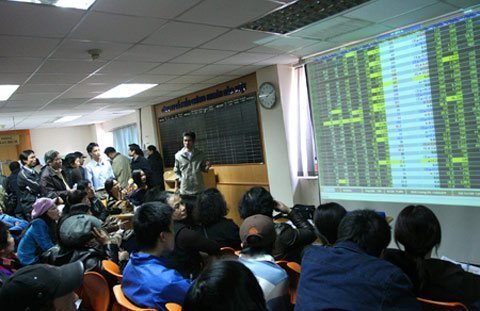VietNamNet Bridge – Ninety five securities companies have to compete fiercely
with each other to scramble for the small 40 percent remaining brokerage market
share, while the other 60 percent has been controlled by a few big companies.

While big securities companies such as SSI, HCM, VDS, VND and BVSC excitedly
report their satisfactory business results for the first six months of 2012,
medium and small companies still keep silent. The most updated information
investors have got is the turnovers and the profits of the first quarter of
2012, provided by listed securities companies.
Especially, ASC, Alpha, Woori CBV, Viet Quoc have not released the business
results for the first two quarters of the year. Meanwhile, Hoang Gia, Toan Cau,
Me Kong and Rubber Securities Company have been absolutely silent. No finance
reports, no annual reports have been shown on the official websites of the
company for investors to consider. The website of a securities company was
inaccessible.
There are 105 operational securities companies, but only a few of which can live
well. Brokerage, consultancy, depository services and securities trading
activities have never been the main sources of income for the majority of
securities companies.
Nearly 70 percent of the income of AVS in the first quarter of 2012 came from
other services. The same figures have been reported by VIX and APG. As for WSS
(the Wall Street Securities Company), the Q1 finance report showed that 89
percent of the revenue of WSS was from other sources.
“Other sources” here means the income from the interests and finance services (repo
service, for example). However, experts have warned that the important sources
of income may put securities companies under high risks.
The risks prove to be higher for the small companies with modest capital and
risk management experience. Ha Thanh, and SME Securities Companies have been
cited as typical examples.
The State Securities Council (SSC) is drafting a Ministry of Finance’s decision
stipulating the organization structure and operation of securities companies.
Under the draft, securities companies would not be allowed to invest in real
estate projects. They would not be allowed to hold more than 20 percent of the
circulating shares of a listed institution or 15 percent of capital of an
unlisted company. The total money borrowed or lent of the companies must not be
three times higher than their stockholder equities.
Experts have warned that if the draft regulation comes true, this would help
securities companies to control their operation and ensure the safety, but would
put big difficulties for small companies.
Still having to live
Most of the small securities companies have been trying to cut down expenses.
AVS, for example, has reduced the business cost in the first quarter of 2012 by
six times to 3 billion dong. Especially the company has vowed to reduce the
total expenses from 69.5 billion dong in 2011 to 8 billion dong in 2012.
The method would help AVS make profit in the current difficulties. However, this
also means that AVS has scaled down its operation significantly.
Other companies have been making every effort to increase the chartered capital.
ASC, for example, has raised the chartered capital from 36 billion dong to 56
billion dong. The only buyer of the additionally issued shares is Phan Minh Hoan,
President of ASC, who has raised his ownership proportion from 40 percent to
65.29 percent.
Nhat Viet Company is seeking new investors who can buy more than 51 percent of
stakes of the company.
Phuoc Ha
- © Copyright of Vietnamnet Global.
- Tel: 024 3772 7988 Fax: (024) 37722734
- Email: evnn@vietnamnet.vn